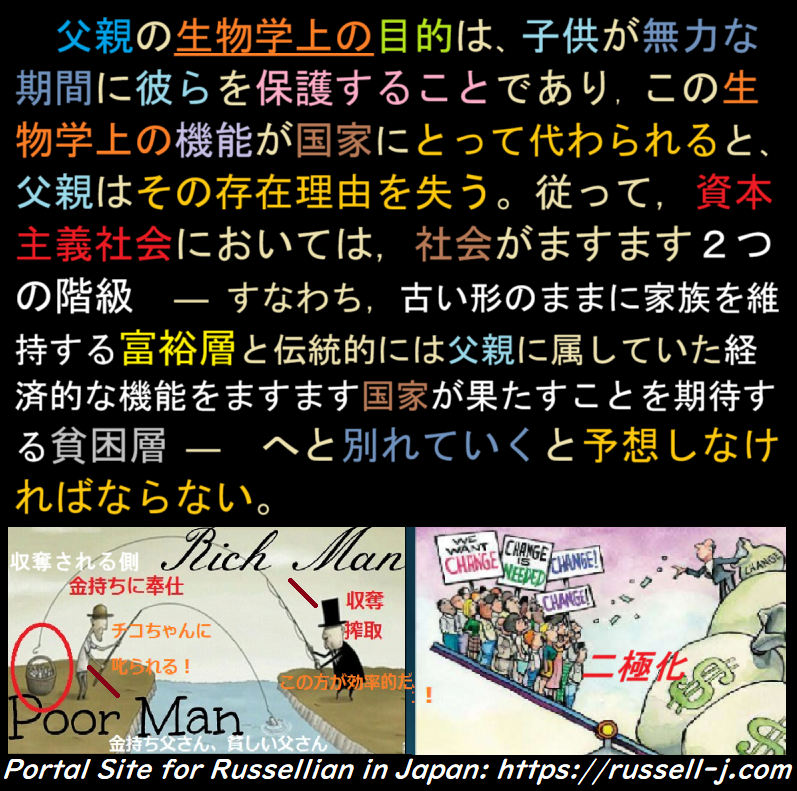
父親の生物学上の目的は、子供が無力な期間に彼らを保護することであり,この生物学上の機能が国家にとって代わられると、父親はその存在理由を失う。従って,資本主義社会においては,社会がますます2つの階級 ― すなわち,古い形のままに家族を維持する富裕層と伝統的には父親に属していた経済的な機能を益々国家が果たすことを期待する貧困層― へと別れていくと予想しなければならない。
The biological purpose of the father is to protect children during their years of helplessness, and when this biological function is taken over by the State, the father loses his raison d'etre. We must, therefore, in capitalistic communities expect an increasing division of society into two castes, the rich preserving the family in its old form, and the poor looking more and more to the State to perform the economic functions traditionally belonging to the father.
Source: Marriage and Morals, 1929, by Bertrand Russell
More info.: https://russell-j.com/beginner/MM14-090.HTM
<寸言>
私たちは「家族」という言葉を、明確な意味を持つものとして日常的に使っています。しかし、実際には、この「家族」という概念は、歴史的・文化的・法的に多義的です。
たとえば、「家族とは、血縁・婚姻・養子縁組などによって結ばれた人々の集まりであり、一定の親密性や扶養関係、感情的つながりを特徴とする社会的単位である」というのが一般的な定義とされています。
、 ところが現代では、この「家族」の形態がかなり多様化してきています。先進国では核家族化が進み、さらに都市部では一人暮らし(単身世帯)が最多となっています。一人では「家族」とは呼びにくいものの、両親を亡くした兄妹姉妹だけの家族も少なくありません。
ここで「家族」を構成する要素を簡単に整理してみましょう。
(1) 人数:ふつうは二人以上(一人では単身世帯とは言っても、一人家族とは通常言わない。)
(2) 関係性: 血縁、婚姻、養子縁組などの法的・社会的絆があるのが普通であるが、血縁関係のない養父母・継子なども家族とみなさる。
(3) 同居: これは必須ではなく、離れて暮らす家族も多い。
(4) 経済的・情緒的関係: 通常は扶養関係などがあるが、情緒的関係しかない場合もある。
(5) 文化的側面: 拡大家族や単親家族など、社会・時代によって変わる。
近年は、同性婚、代理母出産、試験管ベビー、(イーロン・マスクのように世界中に自分の子どもがいる)一夫多妻関係や一妻多夫関係など、従来の枠組みに収まらない家族形態も現れています。こうなると「家族」を一義的に定義するのは、もはや難しくなってきているのかもしれません。
――あなたなら、「家族」をどのように定義しますか?
We use the word "family" in daily life as if it had a clear and definite meaning. However, in reality, the concept of "family" is historically, culturally, and legally multifaceted.
For example, a commonly accepted definition is that a family is a group of people connected by blood ties, marriage, or adoption, characterized by a certain level of intimacy, mutual support, and emotional connection as a social unit.
In modern times, however, the forms of family have become increasingly diverse. In developed countries, nuclear families have become the norm, and in urban areas, single-person households are now the most common. Although it may feel odd to call a single individual a "family," it is not uncommon for siblings alone to constitute a family after the death of both parents.
Let us briefly consider the elements that constitute a "family":
Number of members: Usually two or more. A single individual is typically referred to as a "single-person household," not a "single-person family."
Relationship: Legal or social bonds such as blood relation, marriage, or adoption are common. However, those without blood ties -- such as adoptive parents or stepchildren -- are also regarded as family.
Co-residence: Living together is not essential; many families live apart.
Economic and emotional ties: There is usually some form of financial support, but in some cases, emotional bonds alone may define the relationship.
Cultural context: Concepts of family vary across societies and eras -- such as extended families or single-parent households.
In recent years, various family forms have emerged that do not fit traditional frameworks, including same-sex marriages, surrogate births, IVF children, and polygamous or polyandrous relationships (as in the case of someone like Elon Musk, who has children in multiple parts of the world).
Given this diversity, it may no longer be possible to define "family" in a single, universal way.
-- How would you define "family"?